| |
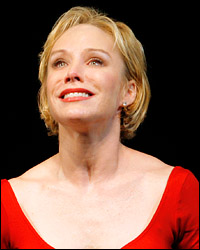 |
|
| Charlotte d'Amboise in A Chorus Line | ||
| photo by Paul Kolnik |
On the difference between performing in A Chorus Line versus Chicago:
"[A Chorus Line is] like going to an audition every night and [being] rejected. I mean, I'm not like one of those actors that's like, 'Oh, I take it home with me,' but after doing it for a year, eight shows a week, you do. You actually do. Those lines that you say and [you're] desperate and you realize that you just don't get away from your life. [Chicago's] Roxie is a character and I love it. You can get away. You just don't get away [from A Chorus Line]."
ELAINE STRITCH
Celebrating Stephen Sondheim's 80th birthday:
"I've been in love with [ Sondheim] all my life... There's no question. And, I'm talking attracted. I think he's one of the most attractive men I've ever known. No question. And, you know what you're in love with, you're in love with his talent, because it tops everything else. You know, everything else disappears, and here's this human being who can give you thoughts like that. Holy Toledo."
ALICE RIPLEY
Discussing being reunited onstage with Brian d'Arcy James, who created the role of Dan Goodman during the musical's Off-Broadway run at Second Stage Theatre, prior to her exit from the Broadway production of Next to Normal:
"He's very generous on stage, and for some reason, we have something that works together. It feels kind of silky, kind of easy to be around him and to work with him onstage. There's mutual respect, and also, on a personal note, when I was at Second Stage, I didn't feel like I could really deliver the show like I wanted to, because I had a vocal injury, and I was having problems integrating Diana with who I am. I guess the way that I approach acting [is] just by living it, living the role onstage and then offstage, finding a balance if you can. So back then, at Second Stage, I had a hard time integrating all of that, and when Brian and I were together, it felt like we never really did the show together, from my perspective. So, it's like a honeymoon right now because we're finally getting to do it together. I'm really happy that I get to spend a few weeks doing it with him. He's making my exit from the show easy."
| |
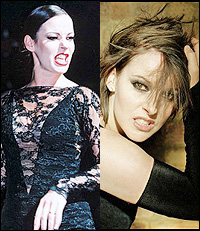 |
|
| Ruthie Henshall as Roxie (left) and Velma (right) |
The London star, who has played both leads in Chicago, Roxie and Velma, answered a few questions about those two merry murderesses:
Which role is more demanding to play? Roxie
Which role is more fun to play? Roxie
Who gets the better songs? Velma
Who gets the better dances? Velma
With whom would you rather go out on the town? Roxie
With which character do you empathize more? Roxie
Which character deserves a sequel? Roxie. Velma has got the Tony, the Olivier, the Oscar and the BAFTA. And that's because she gets all of the money numbers – the songs that make you go "wow!" But Roxie's the heart of the piece. It's her story, so I think she deserves the sequel, so we can see what happens to her. Does she get on with Velma? Does she not? Does she get her own show in the end? Does she get back with Amos? Or does she meet Mr. Fabulous? MARY TESTA
When asked if there is a difference between working on Broadway or Off-Broadway:
"No, not really. It's just the pay! [Laughs.] ... And, it's challenging to be an adult and worry, now, about money. I mean, it's challenging at any age, but somehow, when you're younger, you sort of put blinders on and you kind of go, 'Oh, whatever! I'll get a waitressing job and stuff like that.' But it's a very challenging time right now. Broadway is a nice compensation at times; at least you make a fairly decent living. It's always exciting to work on new musicals and it's always wonderful, but working for free is really a drag. Personally, all I've been doing is benefits and working for free for what seems like months and months now. So while I'm grateful to have an opportunity, I do wish another Broadway show would come along so that I would have a paycheck."
| |
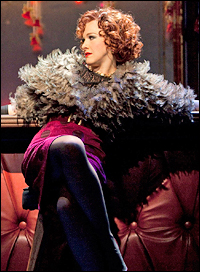 |
|
| Katie Finneran in Promises, Promises | ||
| photo by Joan Marcus |
On how she developed her Tony-winning character in the revival of Promises, Promises:
"My whole approach to the character was to be the opposite of Kristin Chenoweth's [character]. It's funny because the both of us go up for very much the same roles … At first, the idea was to have a blond wig with dark roots. I decided, though, that I should just be the complete opposite of [Kristin's character] and have really dark red hair and drop my voice a lot. And, that's basically how I came up with everything, 'cause I figured Chuck [Sean Hayes] would [be seeking] the complete opposite in a woman."
PATTI LuPONE
When asked what was the nicest comment she had ever received from Stephen Sondheim:
"He said, 'You can be in my musicals any time.' It was after a Ravinia performance … I cannot remember which one it was, but ... basically, I got his stamp of approval. . . . And, I thought, 'I have been waiting to hear that for my entire life!'"
GEOFFREY NAUFFTS
On the surprisingly less-than-political origins of his Tony-nominated play Next Fall:
"On a bigger scale, you can compare Next Fall to humanity. Lift the 'gay' out of the sentence—it's about people. We're so divided in our world, and religion is really behind that division. I would hope that taking a small look at this world and six people in 24 hours—think on a larger scale—there's truth to learn."
NEIL SIMON
About how a simple stroll with his wife led to one of his biggest hits, Barefoot in the Park:
"It was easy to write because it was about our first apartment, about getting married and living together without knowing how to do that. Everything was real, pretty much. We walked barefoot in the park—actually, I wouldn't, but she did. It was a summer night and she took off her shoes and said, 'Why aren't you taking off your shoes?' She said, 'There's something wrong with you. You're afraid to walk barefoot in the park.' I thought, 'Bingo! Play title!'"
| |
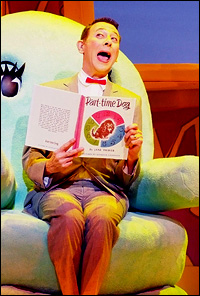 |
|
| Paul Reubens as Pee-wee Herman | ||
| photo by Jeff Vespa |
About making his Broadway debut:
"Oh, my God! Yes, I'm terrified, but I'm excited and energized more than anything. I never talk like this because I'm very tough on myself, but I feel like a little kid, walking around New York with a big secret: Nobody knows but me just how amazing the show's going to be. And now I'm being interviewed for Playbill? Nothing says Broadway to me more than Playbill, so that's almost the most exciting part about this entire thing!"
JERRY HERMAN
Discussing what he considers to be his most important musical:
"Even though I'm a gay man, I didn't write La Cage as a political piece. It has a permanent and special place in my heart, and has replaced Hello, Dolly! in the importance of my shows. I always thought my tombstone would read, 'This is the man who wrote Hello, Dolly!' But that's not true anymore. I'm now better known for La Cage."
DAME EDNA
The self-proclaimed "gigastar" let us in on a little "secret" about the last time she was up for a Tony for Best Special Theatrical Event in 2005:
"Well, they apologized last time for not giving it to me [the last time]. They felt they had to give a Tony to Billy Crystal [for 700 Sundays]. There would have been a bit of a tantrum. They didn't want drama. If you've got the film of the Tony Awards, when Billy Crystal won, watch their lips when they give him the Tony, slow it down, freeze the frame. Their lips are saying, 'But we'd rather give it to Edna,' you watch."
DAVID MAMET
In response to why he wrote the play A Life in the Theatre, the notoriously sarcastic Mamet told director Neil Pepe this story:
"There were these two ancient Nazis, this was like in 1970-something so they must [have] been like, I don't know like, 55 years old at the time. And they kidnapped my mother. And, uh, they told me, if I didn't write the play, they were gonna do some dreadful, dreadful things to her. They weren't specific. But you know, I looked at those uniforms with the jodhpurs and the big, high…hip boots and the Walther automatics…and I said to Gregory Mosher [the director of the original 1977 production in Chicago], I said, 'Greg, what should I do?' 'Dave,' he said, 'Dave. The Nazis got your mom.' So I've used that phrase many times to remind myself that sometimes it's important to undertake difficult tasks in the service of duty."
| |
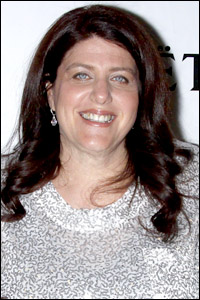 |
|
| Sheryl Kaller | ||
| photo by Joseph Marzullo/WENN |
The Tony-nominated director of Next Fall on attending Broadway shows when she was younger:
"My mother let me cut school. I went to a matinee one Wednesday a month. My first show was 1973, Pippin, directed by Bob Fosse, original cast. I saw the original cast of almost everything. I remember as a kid I didn't not see the original casts: Sweeney Todd, original cast. Chorus Line, original cast. Amadeus, original cast. I stood in Shubert Alley and I looked at [the Next Fall] poster and I was with my 18-year-old who was home from college, and I started weeping. I remember seeing A Chorus Line as a kid, and saying, 'Oh, one day I'm going to have my name in this alley,' and I do. And I cannot make believe that it doesn't mean the world to me, because it does."
MICHAEL GRANDAGE
The British director of Red and Hamlet on his approach to new work by living writers:
"I enjoy responding to a piece of work and doing the piece of work. I don't enjoy reading a play and then thinking, 'How can we change this or shape it or do something with it?' What I want to do is the work, and so I tend to read a play, and have an immediate response that means I want to do it — or, if I like it but I don't know that it's material that speaks to me, which is a different situation, I will happily send it to other directors to find out if they would be interested in directing it. But in terms of me directing a play, I don't enjoy the process of going to a writer and saying, 'Now, can we change this into something else?'"
| |
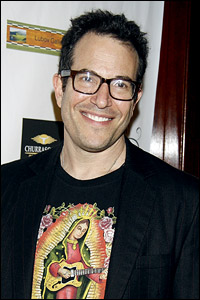 |
|
| Michael Mayer | ||
| photo by Joseph Marzullo/WENN |
The director and co-writer of the book of American Idiot on placing the characters in a suburban setting:
"You know what? I come from the suburbs [in Maryland]. It's in my blood, and I've spent plenty of time in suburban areas and kind of wasteland spots, so it wasn't a hard reach for me to imagine."
DOUGLAS HODGE
The Tony winner of La Cage aux Folles, who has also acted Shakespeare and Chekhov, on the link between drama and comedy:
"I suppose I've always tried to bring out the great clown qualities in the saddest parts. I have a wonderful photo of Grock, probably the greatest clown of all time, just before he was about to go on stage, and he looks more or less suicidal. And I think that they're absolutely, inextricably linked, those two things. You know, to be able to be very, very upset, but also to be able to make people laugh… That's how I've always done my work, really."
FRAN WEISSLER
The Broadway producer on her exposure to theatre as a kid:
"I never had any real exposure to it. I truly didn't. And then when I lived in New Jersey, to go to Broadway was a very big deal and very expensive. So I went two or three times. But now, my God, I think, 'How did I live without it?'"
MARK RYLANCE
On his 35-minute monologue in La Bête:
"It's not terrifying at all, no. It's like if I was a surfer, surfing in Hawaii or somewhere. There's such great waves of laughter that come from the audience, and riding those, knowing when to get up on them and come down and when to move into the next one — each night's very different. No, I don't feel frightened about it at all. It just feels like a lot of fun, to go out and play like that."
STEPHEN SONDHEIM
On his favorite lyric by mentor Oscar Hammerstein II:
"Nobody's ever asked me. It would be hard, you know? Certainly one of my favorite lines of Hammerstein is in 'What's the Use of Wond'rin',' when he says, that 'anytime he needs you, you'll go runnin' there like mad.' That's a line I think is wonderful. ...I like an awful lot of his lyrics, but 'favorite'? Gosh, I don't know. Favorites are hard to pick out. Of anything — favorite show, favorite song — anybody else's or one of my own. Also, what's your favorite this week may not be your favorite next week."










